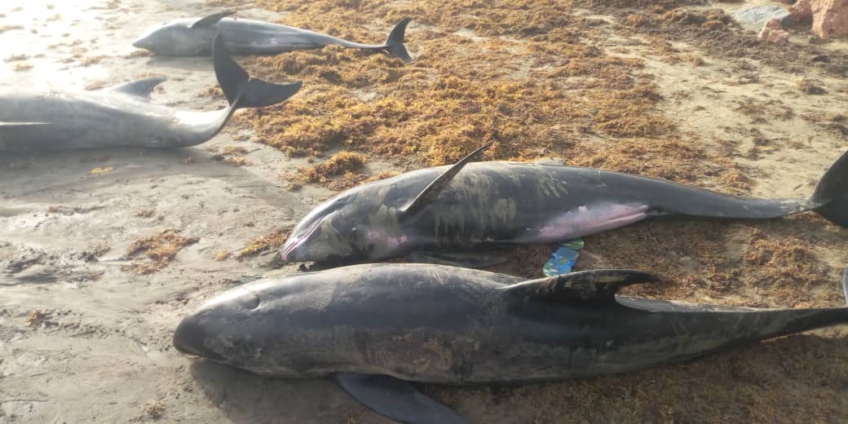Researchers at the University of Ghana have concluded that some fish that washed ashore last week was as a result of low oxygen concentration in the waters.
Preliminary investigations conducted by the Marine and Fisheries Sciences Department revealed that “most parameters required for life in the ocean were within acceptable limits, with the exception of Chemical Oxygen Demand (COD), which was significantly higher than expected.”
This comes on the back of tons of fish washed ashore in Accra which attracted many residents, some of whom picked them up either for consumption or for sale during the Easter festivities.
Similarly, some 60 dead dolphins were sighted at the shores of Axim-Bewire in the Nzema East Municipality of the Western Region.
The Fisheries and Aquaculture Minister, Mavis Hawa Koomson had revealed that fish stress is what caused the mass fish deaths that washed ashore at Osu beach per preliminary investigations by Veterinary Doctors of the Fish Health Unit of the Fisheries Commission.
Fresh information from the University of Ghana researchers corroborates this as it explains that “this oxygen demand would most likely create a condition of stress on living organisms that depend on dissolved oxygen in the water body.”
The department's press press release on April 11 says it observed a sudden drop in sea surface temperature in the coastal waters from Cote d’Ivoire to Togo a few days to the washing ashore of the fish.
Although it is not yet clear what may have triggered this development, “this is most likely an indication of upwelled water from the bottom of the ocean, probably carrying low oxygen concentration,” per the reseachers.
The statement signed by the head of department used the opportunity to appeal to government to procure a ferries geared towards monitoring marine for research purposes as global warming presents new challenges within the field.
"We depend very much on the marine living and non-living resources for a significant portion of our national wealth. It is implicit that we protect this asset through regular monitoring so as to avert any future calamity. The impact of global climate change and its vulnerability is real and coastal states are the worst to be affected," the statement added.
Latest Stories
-
George Twum-Barimah-Adu pledges inclusive cabinet with Minority and Majority leaders
43 mins -
Labourer jailed 5 years for inflicting cutlass wounds on businessman
44 mins -
Parliament urged to fast-track passage of Road Traffic Amendment Bill
45 mins -
Mr Daniel Kofi Asante aka Electrician
45 mins -
Minerals Commission, Solidaridad unveils forum to tackle child labour in mining sector
50 mins -
Election 2024: Engagement with security services productive – NDC
52 mins -
Retain NPP for the good of Ghana – Rebecca Akufo-Addo
52 mins -
‘Let’s work together to improve sanitation, promote health outcome’ – Sector Minister urges
53 mins -
Ellembelle MP cuts sod for six-unit classroom block at Nkroful Agric SHS
56 mins -
‘I’ll beat the hell out of you if you misbehave on December 7’ – Achiase Commanding Officer
58 mins -
AFPNC leads the charge on World Prematurity Day 2024
1 hour -
Court remands unemployed man over theft of ECG property
1 hour -
Election security rests solely with the police – Central Regional Police Command
1 hour -
NCCE engages political youth activists at Kumbungu on tolerance
1 hour -
‘In Mahama’s era students lacked chalk, but are now receiving tablets’ – Bawumia
1 hour

